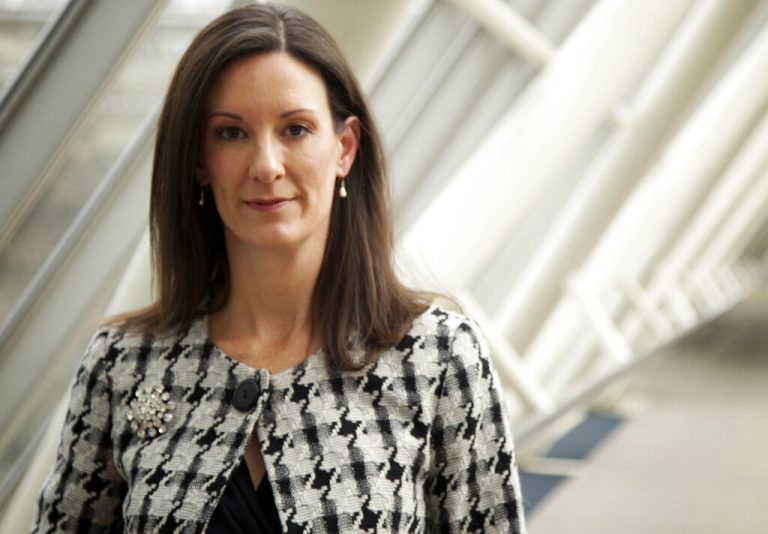WASHINGTON (AP) — The Justice Department on Tuesday named Colette Peters, the director of Oregon’s prison system, to run the federal Bureau of Prisons, turning to a reform-minded outsider as it seeks to rebuild the beleaguered agency.
Peters, who championed steeply reducing the state’s inmate population in the last decade, will inherit a federal agency plagued by myriad scandals. Her hiring comes about seven months after Bureau of Prisons Director Michael Carvajal submitted his resignation amid mounting pressure from Congress after investigations by The Associated Press exposed widespread corruption and misconduct in the agency.
In an interview with the AP, Peters stressed the importance of working to “create an environment where people can feel comfortable coming forward and talking about misconduct.”
When she officially begins her role on Aug. 2, Peters will become only the second director in the agency’s history with no prior experience in the federal prisons system. Deputy Attorney General Lisa Monaco, who led the search for the new director, had been looking for someone who was focused on reforming an agency that has had cultural issues for decades.
Monaco, in a recent interview with the AP, said she sought “somebody who’s got executive experience managing a corrections operation, but someone who’s got real experience and credibility, quite frankly, as a reformer.”
Success
You are now signed up for our newsletter
Success
Check your email to complete sign up
“And I think we have achieved that,” Monaco said. “I know we’ve achieved that with Colette Peters.”
Selected out of 60 candidates, Peters praises the values and mission of the Bureau of Prisons, pointing to the need for correctional systems to prioritize “the principles of normalcy and humanity” and vowed to put the wellness of officers at the forefront of her priority list.
Peters, though, didn’t directly address whether she has a plan to fix the slew of problems at the Bureau of Prisons — an agency that employs more than 30,000 people and has an annual budget of about $8 billion — including sexual abuse by correctional officers, rampant criminal conduct by staff, dozens of escapes, deaths and critically low staffing levels that have hampered responses to emergencies. Peters said she would be remiss if she addressed the allegations before she was in place and fully briefed on the agency’s operations.
“What I can tell you is that corrections is a complex environment,” she said. “It is an environment filled with humans. We have humans overseeing humans. And with that comes opportunity for error. And that comes with opportunity for accountability.”
At the Justice Department, Monaco has been focused on reforming the Bureau of Prisons and addressing allegations of serious staff misconduct. She has assigned senior officials to work on Bureau of Prisons issues full time and has pushed to prioritize the agency’s mission.
“It’s got a dual mission, and it’s equal parts, fully equal parts: safe, secure, humane detention and a focus on and responsibility to prepare people to reenter,” Monaco said.
Monaco said she sees leadership as a main crux of reforming the Bureau of Prisons as the agency moves forward.
“I think it’s leadership, seeing that leadership isn’t one person but it’s a management team,” she said. “It’s a culture that says we need more centralized oversight and accountability and policy management.”
Peters said throughout her career she has taken “very seriously the safety and security of our institutions, obviously for the adults in custody but also for those corrections professionals who come to work every day doing the right thing.”
“They want the individual standing next to them to be making good choices as well,” Peters said of correctional officers. “And so, I’ve always wanted to create an environment where people can feel comfortable coming forward and talking about misconduct, talking about safety and security concerns, and then doing everything we can to address those sooner rather than later.”
Peters said she realized there were “pros and cons” to an outsider taking over as Bureau of Prisons director. But she said it is “a great honor and a great opportunity” to run one of the largest correction systems in the country and declared, “Corrections is in my DNA.”
“I think that it’s always great to have a set of eyes come from the outside and take a look in,” she said. “But that will also come with concerns for the employees at the Bureau of Prisons, wondering how I’m going to get to know the agency and get to know their operations, and so I think it’s pros and cons.”
Peters had faced some scrutiny in Oregon and was accused in a lawsuit of placing underqualified friends in high-ranking positions within the state’s Department of Corrections and creating openings for them by firing other employees or creating a hostile environment causing other employees to quit.
Peters said it was important to build a leadership team “that supports your values and the mission and vision of the agency.” She said the allegations in the lawsuit were without merit and “not founded.”
“That is not how I operate,” she said. “I believe very strongly in recruitment processes and really finding the right person for the right job.”
By Michael Balsamo and Michael R. Sisak, Associated Press.
Article edited for length.
















